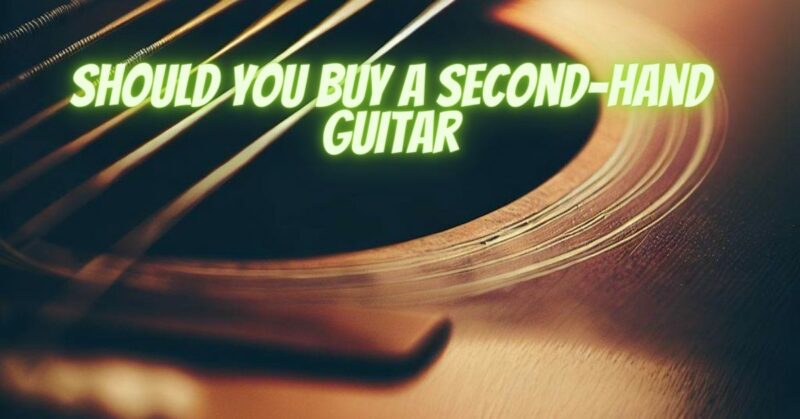Whether you’re a seasoned guitarist or just beginning your musical journey, the decision to buy a second-hand guitar is a significant one. Second-hand, or used, guitars have their own unique set of advantages and considerations. In this article, we’ll delve into the pros and cons of purchasing a second-hand guitar to help you make an informed decision.
The Pros of Buying a Second-Hand Guitar
- Cost Savings:
- One of the most compelling reasons to consider a second-hand guitar is the potential for significant cost savings. Used guitars are typically more budget-friendly than their brand-new counterparts, making it easier to access quality instruments without breaking the bank.
- Quality for Less:
- With the same budget, you can often afford a higher-quality used guitar compared to a new one in the same price range. This means you can start with a guitar that offers better sound and playability.
- Vintage and Unique Finds:
- The second-hand guitar market offers access to vintage and discontinued models that may no longer be in production. These instruments can have unique tones and character that are highly sought after by musicians.
- Already Broken In:
- Used guitars have typically been played and broken in, potentially offering a more mature and resonant sound compared to brand-new guitars that need time to “open up.”
- Established Quality:
- When buying a second-hand guitar, you can research reviews and reputations to ensure that the model you’re interested in has proven quality and durability. You won’t be taking a chance on a brand-new, untested instrument.
The Cons of Buying a Second-Hand Guitar
- Condition Variability:
- The condition of second-hand guitars can vary widely. While some may be well-maintained and in excellent shape, others may have significant wear and tear or hidden issues that require attention.
- Limited Warranty:
- Second-hand guitars may not come with the same warranties or guarantees as new instruments. You may have to rely on your own judgment or the seller’s honesty regarding their condition.
- Potential Repairs:
- Depending on the guitar’s age and maintenance history, you might need to invest in repairs or maintenance to bring it up to your desired playing condition.
- Limited Selection:
- The second-hand guitar market may have a more limited selection compared to the variety of new guitars available. Finding the exact make and model you want in good condition may take time and patience.
Considerations for Buying a Second-Hand Guitar
- Playability: Playability is crucial. Test the guitar to ensure it feels comfortable and suits your playing style.
- Inspection: If you’re unsure about the guitar’s condition, have it inspected by a qualified luthier or technician to assess its overall health.
- Budget: Determine your budget and stick to it. Be sure to allocate some budget for essential accessories like a tuner, picks, and a gig bag or case.
- Purpose: Think about your musical goals. Are you a beginner learning for personal enjoyment, a professional musician seeking a specific sound, or something in between?
- Long-Term Commitment: Consider your long-term commitment to playing the guitar. If you’re unsure, starting with a second-hand guitar can be a financially responsible choice.
Buying a second-hand guitar can be a fantastic idea, provided you approach it with diligence and knowledge. The potential cost savings, access to unique instruments, and the character that comes with a second-hand guitar can make it a rewarding choice for musicians of all levels. However, it’s essential to balance the advantages with the potential downsides and carefully evaluate the condition, history, and value of any second-hand guitar you consider. With proper research and consideration, a second-hand guitar can become a valued companion on your musical journey.


